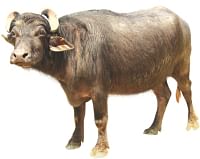Buffalo genome decoded
Buffalo genome decoded
Joint venture feat to boost meat, dairy supply

A Bangladeshi company, Lal Teer Livestock Limited, and Beijing Genomics Institute (BGI) have jointly unravelled the complete genome of water buffalo, opening up a new horizon in developing better breeds of the animal that is vital for milk and meat.
Lal Teer Livestock, an associate of the country's largest private sector seed company Lal Teer Seed, and BGI, the world's largest genomics organisation, are to make a joint declaration of the buffalo genome sequencing success in the capital today.
Genome sequencing allows scientists to identify and understand how genes work together for a plant's or animal's different features like growth, development and maintenance. This also enables them to manipulate the genes and enhance, add or reduce certain features of the plant or the animal.
Bangladesh's success in animal genomics came after a series of similar feats the country and its geneticists have achieved over the last four years by decoding the gene maps of the world's second most important natural fibre -- jute and that of its number one fungal enemy called macrophomina phaseolina.
"Bangladesh, with about two million buffaloes, is ninth in Asia in terms of buffalo population," said molecular scientist Md Moniruzzaman, who led Lal Teer's buffalo genome project and liaises with the BGI.
Talking to The Daily Star, he regretted that buffalo population has declined in Bangladesh over the years in tandem with the rapid mechanisation in farm sector.
Moniruzzaman, who spent several months in BGI's Shenzhen facility for the genome sequencing, said the accomplishment would help reshape Bangladesh's highly potential but largely neglected livestock and dairy sectors, as better breeds of buffalo would attract new entrepreneurs.
He pointed out that buffaloes constituted 30 percent of the cattle population and contributed more than 60 percent of the total milk yield in India and Pakistan, whereas its contribution to dairy field in Bangladesh was very negligible now.
Lal Teer, which has a buffalo farm in Mymensingh and has been trying to produce better breeds through conventional breeding by importing semen from Italy in recent years, thinks that BGI's partnership and the subsequent success in buffalo genome decoding would usher in a new era in buffalo rearing in Bangladesh.
Agriculture Minister Matia Chowdhury has welcomed the private sector's initiative in frontier research in livestock. Talking to this correspondent over the phone yesterday, she also said the government was already promoting buffalo farming in "char" areas.
Bangladeshi scientist Maqsudul Alam, a professor of the University of Hawaii, who earlier decoded the genome of papaya in the US, rubber plant in Malaysia and jute in Bangladesh, yesterday congratulated the buffalo genome project team and hoped this would take the country's genomics science to a new height.
A couple of years back when the BGI and the Lal Teer embarked on the buffalo venture, BGI President Dr Jian Wang had said, “We believe this project will have significant contribution to the breeding and the understanding of water buffalo evolution.”
Under the collaboration agreement, Lal Teer Livestock provided the BGI with the DNA samples from water buffalo for analysis.
The BGI, also credited for its epoch-making human genome mapping project, applied its state-of-the-art facilities to the sequencing job that included sequencing and bioinformatics analysis, including genome assembly, annotation and evolutionary analysis.
According to available statistics, world's current buffalo population is 168 million, of which 161 million are in Asia with India, China, Pakistan and Egypt being the top four abodes of water buffaloes.
Scientists say genomic analysis allows not only the understanding of the species but also their economic importance (milk, meat, disease resistance in the case of buffalo).
The first genome project -- Human Genome Project -- was declared in 2003 and till date genomes of some 25 species (plants, animals) have been decoded.
Among the developing nations, Bangladesh remains in the forefront of genomic research with its credit in genome decoding of four species already -- two verities of jute, a fungi and buffalo.